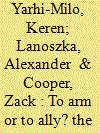|
|
|
Sort Order |
|
|
|
Items / Page
|
|
|
|
|
|
|
| Srl | Item |
| 1 |
ID:
143744


|
|
|
|
|
| Summary/Abstract |
It is widely claimed that secondary states across East Asia are not purely balancing or bandwagoning, but rather hedging between the United States and China by combining policies of economic and political engagement with risk management. We argue that hedging behavior should not include costless activities that do not require states to face trade-offs in their security choices. We redefine hedging as signaling that generates ambiguity over the extent of a secondary state's shared security interests with great powers. This definition returns the focus to security relationships and better accounts for the trade-off between autonomy and alignment. Based on this definition, we argue that hedging occurs in far narrower (but arguably more interesting) circumstances than is widely believed. Many Asian states have existing treaty alliances with the United States or major territorial conflicts with China, creating path dependencies that reinforce balancing behavior rather than hedging. We therefore clarify cross-national variation in state behavior and contribute to the larger research project on regional responses to China's rise.
|
|
|
|
|
|
|
|
|
|
|
|
|
|
|
|
| 2 |
ID:
142989


|
|
|
|
|
| Summary/Abstract |
In November 2011, President Barack Obama announced that the United States would rebalance to the Asia–Pacific region. Although this shift had been underway for years, experts across the Pacific generally welcomed Washington's increased attention. From the beginning, however, the U.S. Congress and governments in Asia have questioned whether the rebalance announcement was backed by the necessary resources and implementation strategy.
|
|
|
|
|
|
|
|
|
|
|
|
|
|
|
|
| 3 |
ID:
143236


|
|
|
|
|
| Summary/Abstract |
OVER THE LAST five years, the United States has struggled to influence Chinese behavior. Washington’s responses to Beijing’s increasingly assertive activities—ranging from economic espionage to artificial island construction—have been largely ineffective. Yet U.S. leaders are now considering a new option: economic sanctions. Conventional wisdom holds that the U.S.-Chinese economic relationship is “too big to fail” and that Washington therefore has little economic leverage with Beijing.
|
|
|
|
|
|
|
|
|
|
|
|
|
|
|
|
| 4 |
ID:
187962


|
|
|
|
|
| Summary/Abstract |
In the wake of Russia’s invasion of Ukraine, many international observers are asking whether China will adopt a similar approach to Taiwan. Debates surrounding “Ukraine today, Taiwan tomorrow” are becoming more frequent, with some suggesting that Beijing could mimic Moscow’s behavior. The two countries have very different strategic circumstances and domestic political structures, but each has reason to learn from the other’s foreign policy successes and failures. To what degree do their coercive strategies overlap or diverge?
|
|
|
|
|
|
|
|
|
|
|
|
|
|
|
|
| 5 |
ID:
149253


|
|
|
|
|
| Summary/Abstract |
How do great powers decide whether to provide arms to or form alliances with client states? This “patron's dilemma” revolves around a decision about how to best provide security to clients without becoming entrapped in unwanted conflicts. Strong commitments worsen the risk of entrapment, whereas weak commitments intensify fears of abandonment. This traditional alliance dilemma can be addressed through the provision of arms and alliances. Great power patrons primarily make such decisions on the basis of two factors: first, the extent to which the patron believes it and its client have common security interests; and second, whether the patron believes that its client has sufficient military capabilities to deter its main adversary without the patron's assistance. Patrons assess the degree of shared threat and the local balances of capabilities in determining whether to support their clients with arms, alliances, or both. As demonstrated in the U.S. provision of security goods to Taiwan and Israel during the Cold War, this strategic logic explains how great powers manage the patron's dilemma.
|
|
|
|
|
|
|
|
|
|
|
|
|
|
|
|
| 6 |
ID:
190664


|
|
|
|
|
| Summary/Abstract |
This essay examines four schools of thought about US strategy in Asia, particularly regarding China. These four viewpoints—here termed the responsible stakeholder, communist collapse, constructive cooperation, and managed competition schools—are determined largely by the answers to two questions. First, to what degree should US policies focus on integrating China into the international order, versus mitigating the consequences of China’s rise? Second, should US policy makers seek a specified end state with China, or simply focus on achieving a stable steady state? Based on a detailed analysis of existing commentary, we assert that most debates about US objectives vis-à-vis China revolve around these questions. This essay concludes that US policies are likely to incorporate aspects of all four theories, which will make it difficult—if not impossible—for the United States to adopt any clear and sustained strategy across administrations. Barring a major breakthrough or breakdown in US–China relations, Washington is destined for a muddled debate on China that will make it difficult to achieve strategic consensus. And this strategic confusion on China will have substantial implications for US regional strategy more broadly.
|
|
|
|
|
|
|
|
|
|
|
|
|
|
|
|
|
|
|
|
|